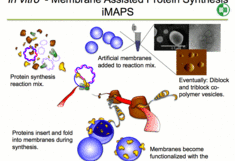Cell-free protein synthesis has hitherto been very successful in the production of soluble proteins. Less successful is the production of viable, correctly-folded membrane proteins. A major obstacle is the tendency for the hydrophobic transmembrane domains to interact and precipitate the products.
In order to provide them with a hydrophobic shield, artificial lipid and polymer membranes have been used as scaffolds during their production. For this purpose, our group employs a variety of artificial membranes synthesised from phopholipids such as phosphatidylcholine and phosphatidylethanolamine, as well as from polymers such as poly(butadiene-ethylene oxide).
A powerful method describes the inclusion of artificial membranes during the process of protein translation in the absence of detergents. This in vitro membrane-assisted protein synthesis relies on the insertion of nascent proteins into the artificial membrane while still attached to the ribosome. Reports show that this method is able to produce proteins which retain their native conformation and function.
In vitro membrane-assisted protein synthesis is one of the major tools used in our group.

